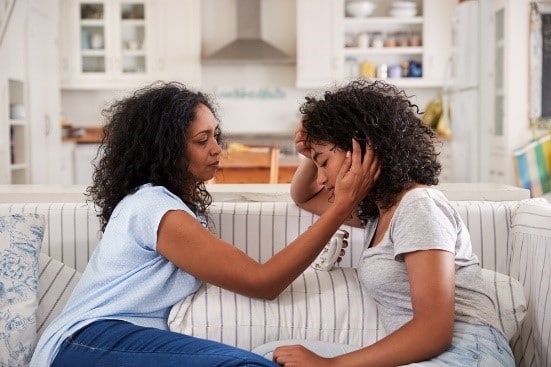When your teen starts dating, it can be a scary time for parents. Tons of questions run through your mind – are they old enough to date? Does this person treat them with respect? Are they a good influence? Is it a healthy relationship? As parents, it’s our job to worry about our children and that worry doesn’t go away whether they are 2 or 52. We try to suppress our worries and fears so our children can spread their wings, but when you have a gut feeling that something just isn’t right, it’s a feeling you can’t shake.
During the teenage years,  it’s normal to become infatuated with others at lightning speed. You may hear your teen talking about someone for the first time one day and then a few days later they are talking about going out on a date with that person. Teen relationships can develop quickly and at that age, some teens don’t want to admit to their parents that perhaps there is a reason to worry about the person they are dating. They may keep the relationship going to avoid embarrassment and/or shame. Other times, the person they are dating may be the popular kid at school or in their circle of friends and they don’t want to let that feeling go. One thing is for sure, you’ll never know what’s going on with your teen and their relationships if you don’t pay attention to the ques. This is the age that children take a step back from spilling all their feelings to their parents. It’s a shame because this is a time when parents are needed most.
it’s normal to become infatuated with others at lightning speed. You may hear your teen talking about someone for the first time one day and then a few days later they are talking about going out on a date with that person. Teen relationships can develop quickly and at that age, some teens don’t want to admit to their parents that perhaps there is a reason to worry about the person they are dating. They may keep the relationship going to avoid embarrassment and/or shame. Other times, the person they are dating may be the popular kid at school or in their circle of friends and they don’t want to let that feeling go. One thing is for sure, you’ll never know what’s going on with your teen and their relationships if you don’t pay attention to the ques. This is the age that children take a step back from spilling all their feelings to their parents. It’s a shame because this is a time when parents are needed most.
When is a relationship truly unhealthy?
Let’s say that you have this nagging feeling that your teen isn’t being treated right by the person they are dating. If you have those feelings, you should to take it a step further and determine if your teen is in an abusive relationship. It’s important to point out that abuse can happen at any age and at any socioeconomic level. People can be psychologically abused, physically abused, and/or sexually abused. Below are just some examples that fall under the three categories, but the lists are extensive:
- Psychological Abuse: Humiliation, isolation, intimidation, yelling/screaming, threatening, calling names, sabotage, jealousy, forcing person to do things against their will
- Physical Abuse: laying hands on the other person such as slapping, hitting, choking, etc., ruining property, restraining, throwing objects, using objects to intimidate
- Sexual Abuse: Humiliation sexually, rape, sexual assault, refusing to use protection during sex
What to look out for
You may have an idea after reading the examples above on whether your teen may be in an unhealthy dating relationship. There are other things to look out for and luckily, there are ways you can help. Keep an eye open to make sure that your teen isn’t losing friends or withdrawing from family. Remember, it’s normal for teens to want some alone time and to want to hang with their friends over their family. Just make sure it’s not becoming a situation where they are only spending time with their boyfriend/girlfriend because that’s not healthy. Is your teen always in contact with this person? Feeling that they need to “check-in” or let them know what their plans are? Big red flag. If your teen interacts with other boys/girls their age does this person get jealous? Is your teen feeling the need to stand up for their boyfriend/girlfriend? Is your teen acting sad or depressed since they started dating? These are all huge warning signs that their relationship isn’t right for them.
Taking action
Okay, so the warning signs are flashing r ight in front of your face…what do you do? First, keep in mind that you don’t want to come across as confrontational. Your teen is likely embarrassed and even though the abuse isn’t their fault, they may feel like it is. Remember, at this age, their brains can’t clearly sort all of this out like yours can, especially since they are in the middle of the storm. Make sure you let them know that you will listen and not pass judgement on them or their situation. Try to make them understand you believe them and what is happening. Let them know you think it’s brave and courageous that they decided to tell you. You could take that time to devise a plan as to how they will end things with the person so they have a good breakup plan. Also, keep in mind that criticizing their boyfriend/girlfriend will not work. In fact, it may draw your teen in closer to them. If at any time you are having trouble getting through to your teen research some dating abuse websites such as thehotline.org. They have helplines available for teens in abusive relationships.
ight in front of your face…what do you do? First, keep in mind that you don’t want to come across as confrontational. Your teen is likely embarrassed and even though the abuse isn’t their fault, they may feel like it is. Remember, at this age, their brains can’t clearly sort all of this out like yours can, especially since they are in the middle of the storm. Make sure you let them know that you will listen and not pass judgement on them or their situation. Try to make them understand you believe them and what is happening. Let them know you think it’s brave and courageous that they decided to tell you. You could take that time to devise a plan as to how they will end things with the person so they have a good breakup plan. Also, keep in mind that criticizing their boyfriend/girlfriend will not work. In fact, it may draw your teen in closer to them. If at any time you are having trouble getting through to your teen research some dating abuse websites such as thehotline.org. They have helplines available for teens in abusive relationships.
Abuse is never right at any age. When teens are feeling vulnerable, embarrassed, and are still growing into their own skin, they may feel scared, ashamed, and embarrassed discussing their woes with anyone – even their best friends – because they would rather suffer than risk the judgement and humiliation that they would feel. Always keep being the amazing parent(s) that you are, keep your eyes peeled for the warning signs, and let them know that you are there to talk things through when they are ready. You’ve got this!
If you have a teen who was struggling in traditional school and are looking for an alternative way for them to still learn and earn their high school diploma, My Virtual Academy may be the perfect fit! Our students work virtually, from the comfort of their home, at their own pace, at times that work best for them. Reach out to us on our website or by calling us at 800-297-2119 for more information. Our Enrollment Specialists are standing by waiting to answer your questions.

